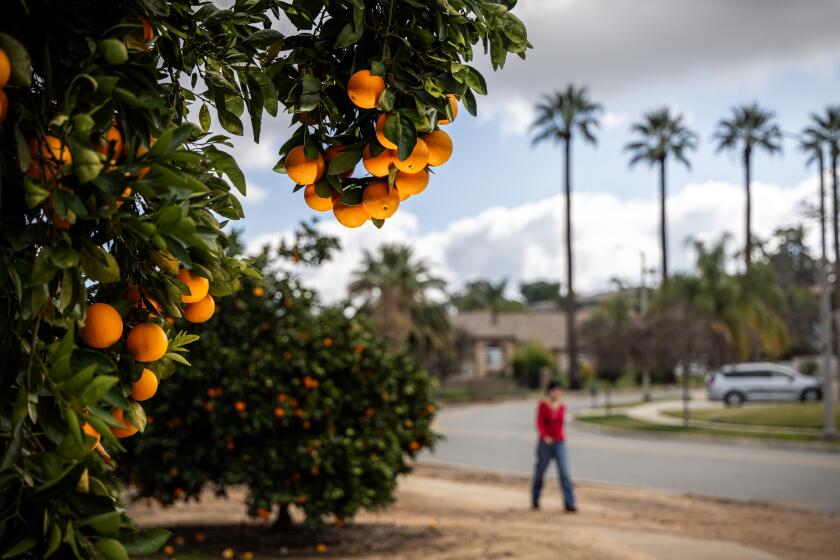King Bee of Whittier Wins Swarms of Praise
David Bradley began his relationship with bees nearly 57 years ago in Murray, Neb., a farming town in the heart of the rich Midwestern agricultural belt.
A swarm had lit in a neighbor’s mulberry hedge. The bees were not unwanted, though. It became a matter of how to capture the swirling throng. Help was sought and David, then 18, volunteered. Very delicately, but with little fear, he approached the hedge and shook the bees into a wooden egg crate. David was rewarded the next fall with half a dishpan of honey.
Two years later, in 1930, when another swarm lit in a tree two blocks from David’s home, neighbors knew whom to call.
From neighbor’s helper to hobbyist to sideline businessman, David Bradley went on to become one of the largest beekeepers in Nebraska and later became one of the most influential beekeepers in Southern California.
Whittier Resident Remains Enthusiastic
Today, at age 75, the Whittier resident says his physical stamina has waned, but his enthusiasm and fascination with bees is as high as ever.
“Everything has its own nature,” Bradley said. “And bees are like anyone else. They can be bred to be mean or gentle. I’ve seen bees that are good housekeepers, who keep their hives very clean, and I’ve seen bees who are dirty housekeepers. You always encounter differences.”
In his 56-year career, Bradley has imparted his zeal to others he has helped to start in beekeeping. Those ranks include his wife of 20 years, Valerie, 73.
“I learned to love it from David, but I also learned that beekeeping is hard work,” Valerie said, describing working in coveralls, boots and bee veils and hauling 30- to 45-pound boxes in 100-degree heat.
That the fun and fascination outweigh the bother is evident from the fact that Bradley’s son, John, who lives in Blythe, and three of Bradley’s grandsons have become beekeepers.
Belongs to Beekeeper Clubs
In the small, neat house that David and Valerie share with Barf, a puff of white fur that they say is part poodle and part Chihuahua, are plaques commemorating Bradley’s efforts on behalf of beekeeping. He is a member of the State Beekeepers Assn., the Los Angeles County Beekeepers Assn., the Kern County Beekeepers Assn. and the Southern California Beekeepers Assn., which he helped to found and which recently honored him with a life membership.
Dale Harris, president of the Southern California Beekeepers Assn., has known Bradley for six years and was introduced to his first swarm through Bradley.
“The enthusiasm that David brought to many of us in this business is still there,” Harris said. “He is always there to give of his time, encouraging you, helping you, teaching you. . . . I really think that when David Bradley ends in this profession, it will be the end of an era in beekeeping.”
Bradley, like most beekeepers in the business, has been what is known as a “sideliner,” someone who keeps from 100 to 300 colonies of bees. A hobbyist is generally described as a keeper of up to 50 colonies. A colony, which is the same as a swarm, contains 20,000 to 70,000 bees.
At his peak, in 1946, Bradley had 800 colonies that produced 30 tons of honey. One year, Bradley sold $35,000 worth of honey. “There is a profit motive involved,” he acknowledged. But in fact, most beekeepers must work at another profession to make ends meet. Bradley was a fourth-generation butcher until his retirement in 1972.
Bradley does not find the two vocations incongruous. “It’s all a part of producing food,” Bradley said. In addition to producing honey--alfalfa and cotton honey, orange and even avocado honey--the Bradleys’ bees are used extensively for pollination.
Bees Rented for Pollination
The bees can be rented for $15 a swarm, two to three swarms per acre, to spend about three weeks in an orchard spreading pollen from flower to flower.
“We’ve had spinach, cabbage and onions this year,” Valerie Bradley said, referring to plants that have been pollinated by Bradley bees. “We’ve also done almonds and kiwis.”
Most of the Bradley bees are kept on family land near Wasco, in Kern County, where they have 200 colonies, and in Fallbrook, near San Diego, where they have 150 colonies. They keep one colony at their home.
Amid orange, peach and apple trees, several dozen white bee boxes, honeycombs, netting, old boots and coveralls, Bradley is at home with his bees.
“An interest and a curiosity is all you need,” Bradley said of beekeeping.
“Those of us who have been taught by David still can’t keep out of the (bee) boxes to see what’s going on,” Dale Harris said. “That enthusiasm and curiosity have stayed with David Bradley.”





